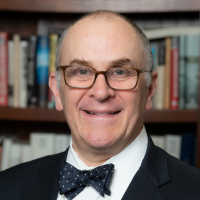Dostoevsky’s Demons
Study Dostoevsky's great novel on the nature, logic, and social origins of revolutionary politics.
Winter 2021
Online Seminar Series
Gulliver’s Travels by Jonathan Swift (1726) is an adventure story, political satire, and philosophical treatise. Lemuel Gulliver’s voyages may take him to fantastical lands filled with fantastical peoples, but Swift’s subject, always, is human nature – what is best for man, and how should he live? Through Gulliver’s explorations of four very different societies, Swift engages in age-old philosophical arguments – particularly the quarrel between “the ancients and moderns.” But rather than provide a simple resolution of the quarrel, Gulliver’s Travels sets out the terms, stakes, and significance of that debate.
This seminar will meet online weekly on Mondays from 6 to 8 PM ET. All course materials will be provided. Fellows will receive a $200 stipend contingent upon participation in the course and completion of a brief response paper and evaluation.
Image: Sawrey Gilpin, Gulliver Taking His Final Leave of the Land of the Houyhnhnms, 1789.
Ryan Hanley on teaching Gulliver's Travels

Ryan Patrick Hanley is Professor of Political Science at Boston College. His research in the history of political philosophy focuses on the Enlightenment. He is the author of Our Great Purpose: Adam Smith on Living a Better Life and Love’s Enlightenment: Rethinking Charity in Modernity.

Ryan Patrick Hanley is Professor of Political Science at Boston College. Previously, he was the Mellon Distinguished Professor of Political Science at Marquette University. His research in the history of political philosophy focuses on the Enlightenment.
He is the author of Our Great Purpose: Adam Smith on Living a Better Life (Princeton University Press, 2019), Love’s Enlightenment: Rethinking Charity in Modernity (Cambridge University Press, 2016), and Adam Smith and the Character of Virtue (Cambridge University Press, 2009). His edited volumes include Adam Smith: His Life, Thought, and Legacy (Princeton University Press, 2016), the Penguin Classics edition of Adam Smith’s Theory of Moral Sentiments (Penguin, 2010), and with Darrin M. McMahon, The Enlightenment: Critical Concepts in History, 5 vols. (Routledge, 2010).
His articles have appeared or are forthcoming in American Political Science Review, American Journal of Political Science, Journal of Politics, European Journal of Political Theory, Review of Politics, Social Philosophy & Policy, History of Political Thought, Journal of the History of Philosophy, Revue internationale de philosophie, and Archiv für Geschichte der Philosophie.
Professor Hanley received his B.A. from the University of Pennsylvania, his M.Phil. from Cambridge University, and his Ph.D. from the Committee on Social Thought at the University of Chicago. Prior to Marquette, he was a Mellon Postdoctoral Fellow at Yale University’s Whitney Humanities Center.
Readings:
Questions:
Readings:
Questions:
Readings:
Questions:
Readings:
Questions:
Readings:
Questions:

Jacob Howland
Jacob Howland is McFarlin Professor of Philosophy Emeritus at the University of Tulsa. He has written about Plato, Aristotle, Xenophon, Kierkegaard, the Talmud, the Holocaust, ideological tyranny, and other subjects. His most recent book is Glaucon’s Fate: History, Myth, and Character in Plato’s Republic.

Flagg Taylor
Flagg Taylor is the Executive Director of the Center for Civics, Culture, & Society, at Miami University. His research specialty is in the history of political thought and American government, especially the question of executive power. He is Chair of the Academic Council of the Victims of Communism Memorial Foundation.

Eliot Cohen
Eliot Cohen is the Robert E. Osgood Professor at the Johns Hopkins University’s School of Advanced International Studies (SAIS) where he has taught since 1990. He served as Dean of SAIS from 2019 to 2021. In addition to public service in the Department of Defense he served as Counselor of the Department of State from 2007 to 2009.

Jenna Silber Storey
Jenna Silber Storey is a senior fellow in the Social, Cultural, and Constitutional Studies department at the American Enterprise Institute (AEI), and co-director of AEI’s Center for the Future of the American University. She is concurrently an SNF Agora Fellow at Johns Hopkins University, and a research fellow at the Civitas Institute at the University of Texas at Austin. She also serves on the executive committee of the Alliance for Civics in the Academy.

Ryan P. Hanley
Ryan Patrick Hanley is Professor of Political Science at Boston College. His research in the history of political philosophy focuses on the Enlightenment. He is the author of Our Great Purpose: Adam Smith on Living a Better Life and Love’s Enlightenment: Rethinking Charity in Modernity.

Gregory Weiner
Greg Weiner is President of Assumption University and founding director of the Daniel Patrick Moynihan Center for Scholarship and Statesmanship. He is the author of American Burke: The Uncommon Liberalism of Daniel Patrick Moynihan and Old Whigs: Burke, Lincoln and the Politics of Prudence.

Tobin Craig
Tobin Craig is Associate Professor at Michigan State University. His studies focus on the intersection between modern political philosophy and modern science and technology. He is currently at work on a book length study of the unity of Francis Bacon’s scientific and political thought as well as a study of the place of technology in American political thought.

Bernhardt Trout
Bernhardt L. Trout is the Raymond F. Baddour, ScD, (1949) Professor of Chemical Engineering and Director of the MIT Society, Engineering, and Ethics Program. He received his S.B. and S.M. degrees from MIT and his Ph.D. from the University of California at Berkeley. In addition, he performed post-doctoral research at the Max-Planck Institute. Professor Trout is the co-editor of the 2016 volume Mastery of Nature.